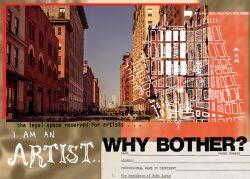A group of Soho residents, aggrieved by new rules for development and artists’ housing, wants a state court to annul the neighborhood’s rezoning.
The Coalition for Fairness in Soho and Noho sued the city and the mayor Thursday, alleging that the purported goal of creating affordable housing in a high-opportunity area was “pretext to facilitate the demolition of historic landmarks, and thereafter promote the proliferation of big-box chain stores, office buildings, and luxury housing.”
The lawsuit targets the rezoning’s rule for converting units reserved for certified artists — Joint Live Work Quarters for Artists — into legal residences. Owners who convert the units must pay $100 per square foot to an arts fund run by the city. That could ding their property values because potential buyers of unconverted units could lower their bids to account for the fee and renovation costs.
On the other hand, the rezoning makes legal conversion of the units possible, which should attract buyers. But the plaintiffs do not see that as a benefit because the artists-only rule had been unenforced anyway.
The city does not even have a record of whether certified artists actually live in the 1,636 artists’ units in Soho and Noho. Fewer than 100 artists have been certified in the past decade, according to data from the Department of Cultural Affairs.
Owners say they relied on this lax enforcement when they purchased their apartments. The lawsuit also argues that without guidance from the city on how to convert units, they will not be able to find buyers or banks willing to finance renovation work. Even certified artists could be punished if they live in buildings that must be converted, the lawsuit claims.
The new rules make the homes economically unproductive, the lawsuit states. It adds that by allowing bigger buildings, the rezoning will prompt developers to replace rent-regulated buildings with luxury housing.
“If this unconstitutional policy is not vacated, many residents will face the cruel choice of displacement from their homes or bankruptcy,” Jack Lester, an attorney for the coalition, said in a statement.
The group raised nearly $250,000 through a GoFundMe page to pursue the lawsuit. Donors included residents of artists-only units. The co-op board for 515 Broadway, home to supermodel Heidi Klum, kicked in $5,000.
Lawsuits challenging rezoning rarely succeed. In July, a state court judge dismissed another lawsuit seeking to halt the Soho and Noho rezoning. A challenge to the Inwood rezoning failed in 2020.
“The [Soho] rezoning underwent a thorough public review process, which included a comprehensive environmental impact statement,” a city Law Department spokesperson said in a statement. “We have successfully defended this rezoning before, and we aim to do so again.”
The city began certifying artists in 1971 to create a legal option for artists living and working in former factory space in Soho. But the neighborhood has since changed dramatically: It is now among the wealthiest in the city.
Read more


Separate from the rezoning, the City Council approved a bill to address the lack of enforcement on artist units.
But on Jan. 14, Mayor Eric Adams vetoed the bill, which would have required new owners to register such units within 90 days of purchasing them. It also would have increased the fines for non-artists living in artist-only units to $15,000 for the first offense and $25,000 for each subsequent one, plus $1,000 per month until the apartment is converted or sold to an artist or someone intending to convert it. The current fine is $2,500.
The mayor said the fines were too high and would punish existing residents, but that he was committed to providing a legal pathway for conversions and “to make sure windfall profits of those sales get invested back into the artistic legacy for Soho and Noho.” Bill sponsor Margaret Chin, who left office six weeks ago, told The Real Deal that she was surprised by the veto.
“The fine system still exists. That did not change,” she said. “This is a bill, a mechanism, so that you can track these units.”
Reviving the measure in any form likely won’t sit well with Chin’s successor, Christopher Marte, who opposed the rezoning and the bill. City & State reported that Adams might have vetoed the bill in part to reward Marte for supporting the mayor’s initial pick for City Council speaker, Francisco Moya. Marte has dismissed this idea.
Several residents of units identified as artist housing on buildings’ certificates of occupancy contributed to Marte’s campaign and to Adams’ transition team, campaign finance records show. The city’s Department of Cultural Affairs would not confirm whether any are certified artists, citing privacy concerns. For those who are not, Adams’ veto removed the risk of heavy fines.
Among the residents who donated to Adams’ transition team was Tommie Pegues, founder of Metropolis Risk Management, who gave $5,000 in December. He is married to developer Don Capoccia of BFC Partners, a board member of a group that pushed to reduce the housing permitted by the rezoning. Adams refunded Pegues’ money Jan. 20.
Kyra Tirana Barry, who is married to Ironstate Development’s David Barry, gave $5,100 to Adams’ transition. The couple bought a 10th-floor unit at the New Museum Building, 158 Mercer Street, for $10.3 million last year, the New York Post reported.
Other Adams donors who own artist units include Tyler and Cameron Winklevoss, of Facebook fame, who each gave $5,100; Tariq Mundiya, of Willkie Farr & Gallagher, who also gave $5,100; and Spencer Kimball, CEO of Cockroach Labs, who gave $3,100, according to public records.
Jeannine Kiely, chair of Community Board 2 and a Friends of Elizabeth Street Garden board member, donated $1,350 to Marte and supported his campaign in 2017. Lawsuit plaintiffs Amit Solomon and Maria Judith Feliciano sent Marte $250 and $50, respectively.
Solomon lives at 684 Broadway and is not a certified artist. He paid nearly $1 million to renovate his home 15 years ago, expecting that lack of enforcement of the artists’ housing rule would continue.
To convert his co-op unit, Solomon says he would need to pay the city $310,000 and spend hundreds of thousands more to bring the unit up to code. Feliciano, who owns a co-op unit at 543 Broadway, similarly argues that converting her apartment would require “a substantial and prohibitive investment.”
